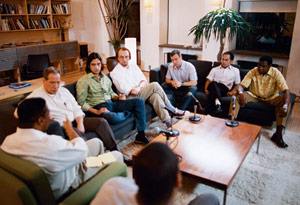Men: What Do They Want With Us?

Photo: Andrew French
They dodge, clam up, problem-solve when you just want them to listen, toss off "yes" or "no" answers when you were hoping to go deeper. The eternal question: What is it with them? For the answers, expert Roland Warren enticed this group of strangers into talking about what they don't like, what we don't know about them, and what will always keep them up at night.
Have you ever had a serious sit-down with the man in your life and come away with absolute clarity...that he just didn't get it? The problem may be interplanetary (Can you hear me now, Mars? How about now?), but Roland Warren, president of the National Fatherhood Initiative, proposes that gender communication gaps are really more about style than substance."People have three layers," says Warren, who speaks with thousands of dads, couples, and families each year. "There's a physical, emotional, and spiritual core. Men tend to engage on the physical level, talking about what happened—not doing life deeply, if you will. This frustrates women, who seem wired to move more quickly from the physical to the emotional, where real intimacy happens."
Warren says that although men do dip into the emotional and spiritual layers, they're much less likely than women to volunteer worries or feelings that might make them appear incompetent or weak. So the way to initiate what a woman would call a real conversation, Warren has learned, is to come up with a good opening line. You might think "Honey, we need to talk" is a rather benign way to start a discussion, but men often take it as a signal to put up the heat shields, anticipating a barrage of criticism and complaints. You probably don't want to bring up the affair your husband is having over sandwich-making, says Warren, but that may be the perfect time to discuss child-raising strategies or job issues. The idea is to make conversation a natural part of your relationship, as opposed to an event, capital E.
Warren also recommends losing the yes or no questions; they make it too easy for a man to shut down the discussion. Open-ended questions—like "When you worry, what do you worry about?" or "When are you happiest?"—are more likely to lead into emotional or spiritual territories, which is where you want them to go.
We put Warren's theories to the test. To decode "the enigma that is us," as Warren himself says, we gathered together an elite group of specialists—which is to say, men. (We also made them pose like a gaggle of supermodels before our cameras—but then we laid out two cases of Bud to get them back on an even keel.) With Warren as moderator, we subjected them to a battery of questions about relationships, self-image, and fatherhood. Here's what we learned...



